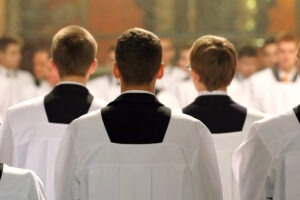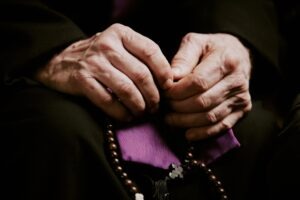Sexual abuse by clergy members is an unimaginable betrayal of trust. For many survivors, this betrayal not only affects their faith but also leaves deep emotional, psychological, and physical scars. In Michigan, like many other states across the country, numerous individuals have come forward, sharing their experiences of abuse at the hands of clergy members, including Deacon Richard Howard.
At White Law PLLC, a Michigan clergy sex abuse lawyer with experience in complex and mass-action litigation will offer compassionate, knowledgeable legal counsel for those seeking justice.
If you are a survivor of clergy abuse, you deserve to have your voice heard, and justice sought on your behalf. We are here to stand with you as you seek accountability and closure.
Legal Recourse for Survivors of Clergy Abuse
Clergy sexual abuse survivors have several legal avenues they can pursue with a Michigan sexual abuse lawyer. These legal options provide a path to seek justice, accountability, and compensation for the harm caused by their abusers. They include:
- Civil lawsuits: Sexual abuse survivors can file a civil lawsuit against individual perpetrators, such as Deacon Howard, and the religious institutions that harbored or enabled them. A civil lawsuit compensates survivors for the damages they have endured, including medical bills, therapy costs, lost wages, and emotional pain and suffering.
- Criminal prosecution: Though law enforcement and prosecutors handle criminal charges, survivors play a critical role in ensuring that justice is served. Coming forward with credible evidence against abusers may lead to criminal prosecution, ensuring that abusers face legal penalties, such as imprisonment.
Understanding the legal timelines for filing a sexual abuse claim with a Michigan criminal defense lawyer is crucial if you are considering filing a lawsuit or pursuing criminal charges.
Under MCL §600.5851b, you have until the age of 28 to file a civil lawsuit related to sexual abuse, or three years from the time you discover the abuse. Our Michigan clergy sex abuse attorneys can help you determine whether your case falls within the statute of limitations and advise you on the best course of action.
If you or someone you know
endured clergy sex abuse,
contact White Law PLLC today.
Understanding the Devastating Impact of Clergy Sexual Abuse
The sexual abuse committed by clergy members is particularly heinous due to the immense trust, power, and authority they hold over their congregants. Clergy are often seen as moral and spiritual guides. When they exploit this position of trust to abuse vulnerable individuals, the impact is devastating and can include the following:
Psychological and Emotional Trauma
Sexual abuse can lead to lifelong emotional scars. As a survivor, you may struggle with feelings of shame, guilt, depression, and anxiety. The trauma can also manifest in trust issues, difficulty forming relationships, mental health disorders such as PTSD, and repressed memories of the abuse, which can resurface in adulthood, leading to new waves of distress.
Religious and Spiritual Devastation
The abuse perpetrated by clergy, including Deacon Richard Howard, can shatter your spiritual foundation. You may feel abandoned by your faith or struggle with conflicting emotions regarding your belief system. Trust in religious institutions, the church, and even in God can be severely eroded, leaving you isolated from the community you once turned to for support.
Physical and Behavioral Consequences
You may experience physical symptoms such as chronic pain, sexual dysfunction, or substance abuse as coping mechanisms for your trauma. The long-lasting effects of the abuse can also interfere with day-to-day activities, making it difficult for you to maintain employment, engage in social activities, or experience a sense of normalcy. These effects can make it difficult for clergy abuse survivors and the road to recovery.
You can contact our clergy sex abuse
lawyers today and rest easier with
experienced attorneys tackling your case.
The Scope of Clergy Abuse in Michigan
Over the past several decades, the scope of sexual abuse in the Catholic Church has become more apparent as allegations of abuse within religious institutions have come to light in shocking numbers. Like many other states, Michigan has been at the center of these revelations.
Dozens of clergy members, including Deacon Richard Howard, have been accused of sexual abuse, leading to a wide-reaching investigation and a reckoning within the church.
In 2018, the Michigan Department of Attorney General launched a comprehensive investigation into allegations of sexual abuse by Catholic clergy, reviewing files and records from all seven dioceses in the state.
The investigation uncovered hundreds of allegations and led to the identification of dozens of clergy members who had been accused of sexual abuse, including Richard Howard. This investigation revealed a disturbing pattern of cover-ups, with many accused clergy being moved from parish to parish rather than being reported to law enforcement.
The Allegations Against Deacon Richard Howard
Howard, a former deacon and religion teacher at a Michigan high school, was accused of molesting a 15-year-old boy while he was 44 years old and was convicted of sex crimes in Bay County in 1989.
Howard pleaded no contest to two counts of attempted second-degree criminal sexual conduct and was sentenced to six months in jail, five years of probation, and a $1,500 fine. He was discharged from probation in 1993 and was not required to register as a sex offender.
Deacon Howard, like many clergy members accused of sexual abuse, is believed to have used his position to gain access to vulnerable individuals, often under the guise of offering spiritual guidance or mentorship.
While the specifics of each survivor’s experience may vary, the common thread in the accusations against clergy members is the abuse of power, authority, and trust. If you are a survivor of clergy abuse, contact our clergy sex abuse attorneys in Michigan today.
How Our Michigan Clergy Sex Abuse Attorneys at White Law PLLC Can Help
White Law PLLC’s clergy sex abuse lawyers in Michigan have years of experience advocating for sexual abuse survivors. We understand how clergy abuse cases work and their unique complexities, including the emotional and spiritual impact of the abuse and the difficulties survivors face when coming forward. Our goal is to provide you with compassionate legal representation and support while pursuing justice on your behalf by helping with the following:
- Confidential and compassionate consultation: We recognize that speaking about your experience can be incredibly difficult. Our team offers a confidential, non-judgmental environment where you can share your story.
- Thorough investigation and evidence gathering: We will conduct a thorough investigation into the allegations against any clergy members who may have abused you. This includes reviewing church records, working with investigators, and gathering witness testimonies to build a strong case on your behalf.
- Navigating the legal process: Our legal team will handle every aspect of your case, from filing the necessary legal paperwork to representing you in court. We will keep you informed and ensure that you understand your rights and options throughout the process.
- Pursuing maximum compensation: While no amount of money can undo the trauma of sexual abuse, financial compensation can help you access the care and support you need to heal. We will fight tirelessly to secure compensation for your medical expenses, therapy costs, lost wages, and pain and suffering.
White Law PLLC Advocates for Survivors of Clergy Abuse
The road to healing after clergy abuse is long and complex, but you do not have to walk it alone.
If Deacon Richard Howard or another clergy member has sexually abused you, we encourage you to contact our team for a free, confidential consultation. Together, we can take the first step toward holding abusers accountable and helping you reclaim your life.
You have the right to reach out to
a clergy sex abuse attorney and
discuss your right to legal action.






